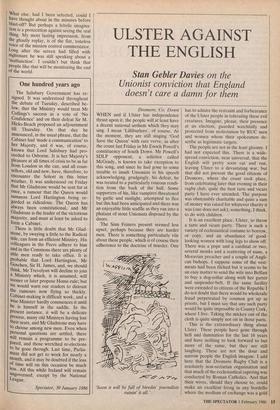One hundred years ago
The Salisbury Government has re- signed. It was understood throughout the debate of Tuesday, described be- low, that the Ministry would treat Mr Collings's success as a vote of 'No Confidence' and on their defeat Sir M. Hicks-Beach proposed an adjournment till Thursday. On that day he announced, in the usual phrase, that the Cabinet had 'made a communication' to her Majesty, and it was, of course, known that Lord Salisbury had pro- ceeded to Osborne. It is her Majesty's pleasure at all times of crisis to be as far from London as she can, and all coun- sellors, old and new, have, therefore, to encounter the Solent in this bitter weather. It was understood on Friday that Mr Gladstone would be sent for at once, a rumour that the Queen would summon Lord Hartington being re- garded as ridiculous. The Queen has always been constitutional, and Mr Gladstone is the leader of the victorious majority, and must at least be asked to form a Cabinet.
There is little doubt that Mr Glad- stone, by swaying a little to the Radical side, can form an efficient Ministry. His colleagues in the Peers adhere to him and in the Commons there are plenty of able men ready to take office. It is probable that Lord Hartington, Mr Goschen, Sir H. James, and, we should think, Mr Trevelyan will decline to join a Ministry which, it is assumed, will sooner or later propose Home-rule; but we would warn our readers to distrust the rumours now flying so thickly. Cabinet-making is difficult work, and a wise Minister hardly commences it until he is himself in the saddle. In the present instance, it will be a delicate process, many old Ministers having lost their seats, and Mr Gladstone may have to choose among new men. Even when Personal questions are settled, there will remain a programme to be pre- pared, and those wretched re-elections to be gone through. Last time, Parlia- ment did not get to work for nearly a month, and it may be doubted if the loss of time will on this occasion be much less. All this while Ireland will remain ungoverned, except by the National League.
Spectator, 30 January 1886














































 Previous page
Previous page